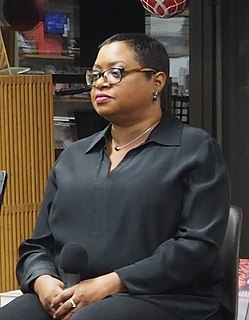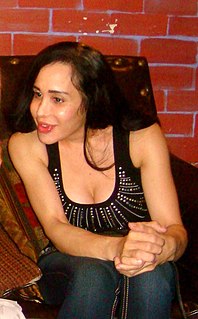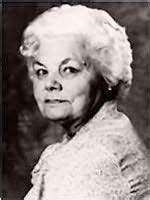A Quote by Anne Rice
I’d thought I knew what beauty was in women; but she’d surpassed all the language I had for it.
Related Quotes
She was a keen observer, a precise user of language, sharp-tongued and funny. She could stir your emotions. Yes, really, that's what she was so good at - stirring people's emotions, moving you. And she knew she had this power...I only realized later. At the time, I had no idea what she was doing to me.
When I looked at [Fannie Lou] Hamer and that speech it seemed to me that she had to be the bravest woman ever, to come before that body and to assert her rights, when she knew that she was going lose that battle. But she did it anyway, because she knew she was speaking not just for herself and for that day, but for me, and for all the other young women who were coming behind her. She didn't know our names, but she was working for us. I find that incredibly empowering.
I believe that there are three conditions to a woman’s beauty. First, you must realize that not all women are beautiful all of the time. Sometimes beauty comes on a subconscious level. When she is in love, or has met someone new and exciting, she shines. Second, you must understand that life is unfair. Beauty is something that, for some, must be worked at. The third condition is luck. Some women can just be lucky.
She wasn't looking her best; her hair was coming down, for she had shed hairpins as she'd run, and her face lacked powder and lipstick. She looked hot and tired and surprisingly happy. He thought that he had never seen anyone quite as beautiful, so absolutely necessary to his happiness. It wasn't the first time he had fallen in love, but he knew that this was the last.
She felt a board indifference toward the immediate world around her toward other children and adults alike. She took it as a regrettable accident to be borne patiently for a while, that she happened to be imprisoned among people who were dull. She had caught a glimpse of another world and she knew it existed somewhere, the world that had created trains, bridges, telegraph wires and signal lights winking in the night. She had to wait she thought, and grow up to that world. - Dagny Taggart
...fact was she knew more about them than she knew about herself, having never had the map to discover what she was like. Could she sing? (Was it nice to hear when she did?) Was she pretty? Was she a good friend? Could she have been a loving mother? A faithful wife? Have I got a sister and does she favor me? If my mother knew me would she like me? (140)
The girl had a certain nobleness of imagination, which rendered her a good many services and played her a great many tricks. She spent half her time in thinking of beauty, bravery, magnanimity; she had a fixed determination to regard the world as a place of brightness, of free expansion, of irresistible action, she thought it would be detestable to be afraid or ashamed. She had an infinite hope that she would never do anything wrong. She had resented so strongly, after discovering them, her mere errors of feeling.
Back and forth she went each morning by the river, spring arriving once again; foolish, foolish spring, breaking open its tiny buds, and what she couldn’t stand was how—for many years, really—she had been made happy by such a thing. She had not thought she would ever become immune to the beauty of the physical world, but there you were. The river sparkled with the sun that rose, enough that she needed her sunglasses.
I knew it,’ she says. ‘I knew I had met you before. I knew it the first time I saw your photograph. It’s as if we had to meet again at some point in this life. I talked to my friends about it, but they thought I was crazy, that thousands of people must say the same thing about thousands of other people every day. I thought they must be right, but life… life brought you to me. You came to find me, didn’t you?




































